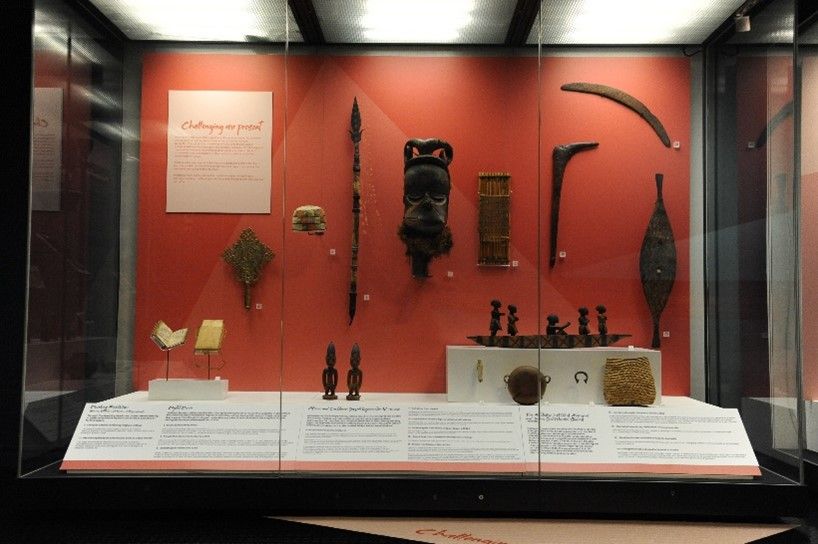Case study | Inclusive Global Histories, Ulster Museum
Decolonisation is a complex topic for many communities. In Northern Ireland, there are particularly sensitive issues relating to culture, identity and the legacy of the British empire.
Racist actions and attitudes were – and are – present in people from various community backgrounds in Northern Ireland. Since 2016, the number of racially motivated hate crimes in the country has outstripped those with a sectarian motivation, despite ethnic minority communities making up just 1% to 2% of the population.
People from ethnic minority backgrounds are not well represented by National Museums NI. Our collections have been traditionally interpreted from a white, western point of view. We know that some of the items in the world cultures collections at the Ulster Museum were acquired through means now deemed highly unethical, and over time have become disconnected from the Indigenous communities
they represent.
Decolonising museums is the right thing do to – there is a strong ethical imperative and we owe it to our audiences and stakeholders.
While National Museums NI had begun some work on addressing racial inequality and exclusion, it was the 2020 murder of George Floyd by a police officer, and the immediate international reaction, including the Black Lives Matter movement, that accelerated the need to address this work more publicly.
One element of this work has been Ulster Museum’s Inclusive Global Histories project and exhibition (until 31 March 2024). The aims of Inclusive Global Histories are to:
- Increase public awareness of the world cultures collections.
- Be open about their problematic origins and status.
- Discuss our approach to decolonisation.
- Involve audiences in discussions about the future of these collections.
In recognition that much of the expertise and experiences needed to inform our approach lie outside the museum, working in partnership with communities has been key.

We have been fortunate to work with passionate and knowledgeable partners – those supporting marginalised communities locally and Indigenous communities internationally – who helped us review the objects proposed for the exhibition through online and face-to-face meetings.
These discussions were an opportunity to get a fuller understanding of the meaning invested in the objects by those that made and used them, and the significance they continue to have in contemporary society.
Working closely with Indigenous Americans Chelle McIntyre-Brewer and Sean Young, we discovered that several of our documentation records for objects such as the Haida bentwood foodbox were incorrect.
The discussions were also emotional. Partners from the African Caribbean Support Organisation for NI (Acsoni) expressed a sense of joy and pride in seeing items such as the yomkwo, a stringed musical instrument from Nigeria, at their local museum in Belfast.
Sadness was felt on reflecting on the history of manillas (commodity money, usually made of bronze or copper) which, during the transatlantic slave trade, were frequently exchanged for people who were then enslaved. It was felt these discussions were a necessary process for healing and reconciliation and expressing these feelings in the object labels was an important part of the process.
Acsoni partners asked provocative questions about how items such as the Ekpo Society Mask, representing an idiok, or dark demon, could have been used to misrepresent Africa and legitimise the presence of missionaries in Africa.
Such questions are a new way of thinking about the impact of collections on communities, and this is represented in the exhibition.
Some partners also donated and loaned items that reflected their lived experiences, hopes and aspirations for the future. This included two items from the Belfast Multi-Cultural Association: a burnt rafter from the roof of their building, which was the target of an arson attack in 2021, and an image of a cheque presented in a subsequent online fundraiser. Both items are powerful in helping us discuss what kind of a society we want for our future.
In the end, 51 objects were selected by the partners for the exhibition, which opened in March. At the start, we shared our commitments to anti-racism, as a marker against which our audiences can challenge us in our work. These are:
- We will bring marginalised voices and stories to the fore.
- We will exchange ideas and learn from others.
- We will highlight and redress the injustices of the past.
- We will face up to uncomfortable truths.
- We will encourage mutual respect and understanding.
Evaluation from the first few months shows that 83% of visitors rate the exhibition “very good” or “good”. While there are feelings of sadness, guilt and anger about racist attitudes and actions, audiences are also “glad to see the stories being told”. On top of that, 76% of our audiences agree that they want to learn more about world cultures, while 68% agree that the museum should do more to highlight and redress racism and exclusionary practices.
The exhibition was first proposed in June 2021, and while it was challenging to complete an exhibition in a relatively short period of time, it has been designed to be flexible. And is a first step, rather than the end result.
As racial inequality is still such a live issue, we have built in resources to update the interpretation, and to bring in new objects and stories into the exhibition over time.
We are continually learning and developing in partnership with our communities locally and internationally. This learning will shape our programmes and services in the future.
As a curator, I am not a trained ethnographer, nor do I have experience of racism. But what I believe I brought to the table were skills and experience in developing partnerships, highlighting hidden histories and developing under-represented audiences, as well as a passion for inclusion and diversity.
Our partners and critical friends, the leadership and encouragement provided by our senior management team, and the guidance provided by the Museums Association’s Decolonisation Working Group were all crucial to the development of the exhibition.